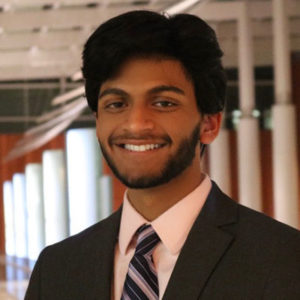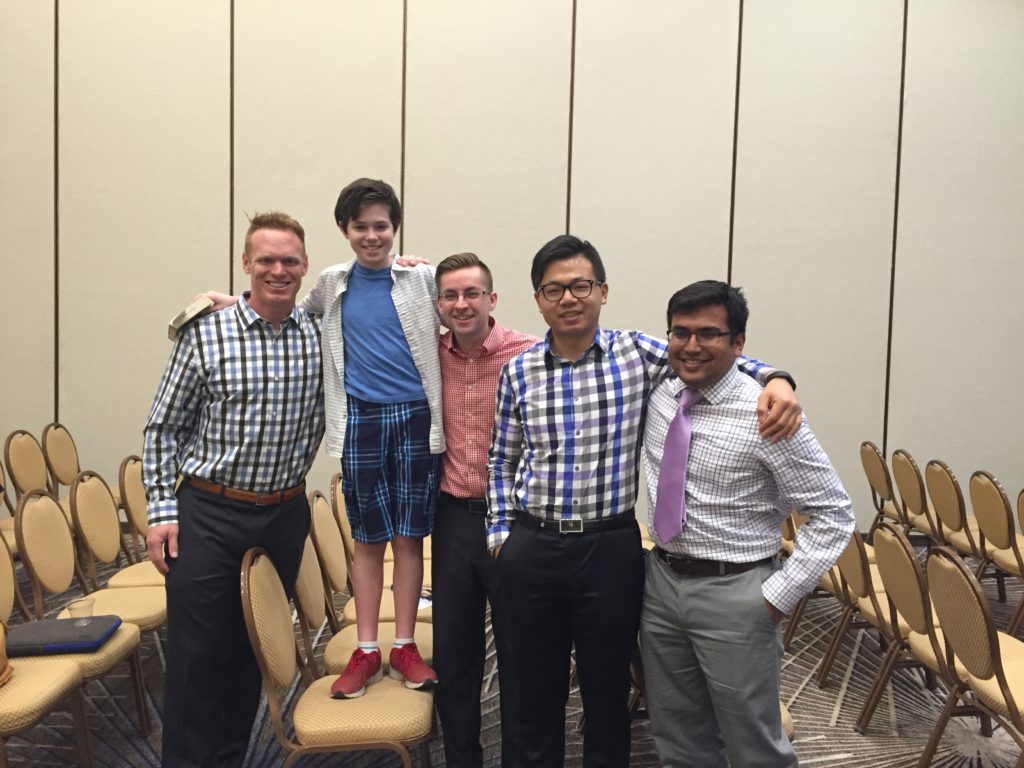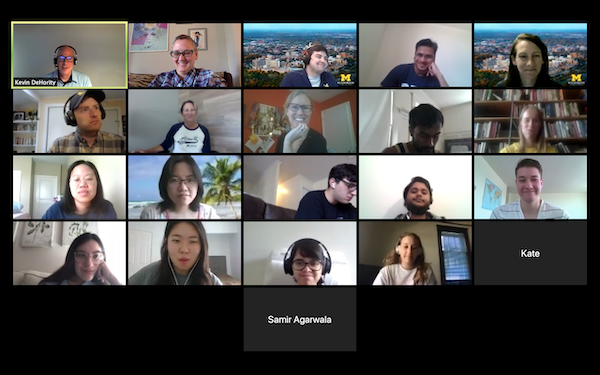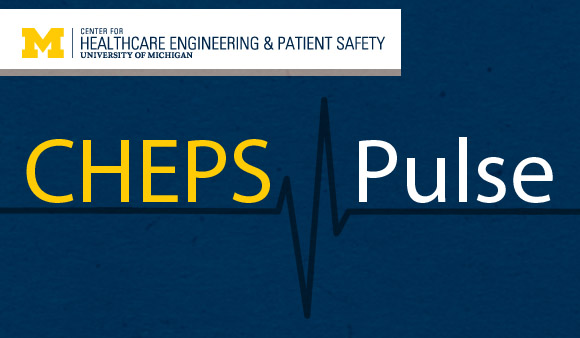In This Issue
- CHEPSter to CHEPSter: Bill Zhang & Advaidh Venkat
- Recent News
- Student Blog
- Where in the World Is CHEPS?
CHEPSter to CHEPSter
An Interview with CHEPS Alum Bill Zhang by CHEPS Student Advaidh Venkat

Much of the work we do at CHEPS revolves around utilizing technology to improve decision-making in the healthcare industry. As an industrial engineer, I’ve realized that, for the vast majority of performance improvement/operations-related issues in the hospital, technology does and has had the answer. The real challenge lies in facilitating a seamless implementation. Bill Zhang, the Director of Hospital and Procedural Services at Kaiser Permanente San Jose Medical Center and a CHEPS alum, tackles such problems on a daily basis. Bill joined CHEPS in 2015 as part of his dual-degree M.S./MPH program at the University of Michigan in Industrial and Operations Engineering (IOE), concentrated in Healthcare Engineering and Patient Safety (HEPS), and Healthcare Administration/Management with the School of Public Health.

“Amy and I met each other at an INFORMS conference when I was a senior in college,” Bill said, as he recalled how he came to learn about CHEPS. “As everyone knows, Amy’s very popular at INFORMS, so it was kind of a big deal meeting a celebrity there!” He joined CHEPS and became involved in the Pediatric ED project and a few projects with the VA Hospital. He was also team lead for the Surgical Instruments project. This summer, Bill was a guest speaker at a virtual CHEPS Lunch & Learn and had the chance to meet the current Surgical Instruments team. He said, “[When I was] at CHEPS,” he remembered, “we were trying to develop a surgical instruments tool that would rate the difficulty of cleaning and the features of each instrument— it was really awesome to see those tools come into fruition when I was having a conversation with some of the current students!”
Now at Kaiser Permanente, one of the country’s leading integrated managed care organizations, Bill oversees twelve departments, comprised of over 300 employees, physicians, and managers. His responsibilities encompass many essential functions of the institution including purchasing, personnel, union negotiations, financial management, strategic planning for expansions, and construction projects. As someone looking to enter the realm of Hospital Administration myself, I was fascinated to learn about Bill’s experiences given we both have backgrounds as industrial engineers. However, the greatest interest Bill and I share is our enthusiasm for exploring new ways of implementing technology to eliminate operational bottlenecks and improve patient experience in the clinic.
“I have had an interest in healthcare technology starting at the end of my undergrad studies, where we developed a tracking system for the linen supply chain in the VA Hospital in Boston,” Bill said. He later joined a technology consulting firm that served primary care and community hospitals on the east coast. There he regularly programmed in SQL and Python and even got a chance to dive into the data science side of technology. “I got to see first-hand how these technologies are helping our physicians, nurses, and organizational leaders in healthcare to make decisions and enable them to provide the best care for our patient population,” he said.
From here, Bill went on to complete many successful technology implementation projects, including a mobile app for indoor hospital navigation and a platform to engage transactions between social services programs and people in need. Most recently, at Kaiser, he helped implement a tool for automatic COVID exposure tracking that uses artificial intelligence to track the interactions COVID-positive patients have within the hospital to ensure the safety of hospital staff. “It has literally been saving lives for the last month-and-a-half,” he said.

Bill highlighted the amount of collaboration that went into these implementation projects. Having the opportunity to work with students who aren’t engineers as part of CHEPS’s multidisciplinary teams has certainly helped me see clinical problems through a different lens. When I asked Bill what role he finds himself playing on teams, he answered that he always sees himself as an industrial engineer at heart. “I constantly find myself in the center of translation, communication, and coordination to make sure the technical team and leadership team work together to provide the best value to our insurance members and patients.” Industrial engineers are trained to understand processes and have a fundamental understanding of technology and its components, giving us the unique opportunity to be a bridge within the technology and business strategy orientation.
Bill further noted that healthcare is not an easy industry to try and experiment with different technologies. Additional regulations from HIPAA and insurance have resulted in a dearth of tools available to mine through the myriad of data available across the country’s healthcare systems. This has put healthcare behind in terms of innovation. Bill noted that on top of this, healthcare employees and vendors are often hesitant about fast-paced innovation and technology adoption. “They’re not ready to suddenly get rid of paper. This kind of resistance within the organization is a challenge we have to fight through in a very diplomatic and artful way to achieve what we really want,” he said. “We need to translate technology into things they can relate to and help them understand its value.”
Bill also had some insights as to how patients have been responding to the recent shift towards virtual care and digital health. He has noticed that we tend to overestimate the public’s understanding of technology but underestimate their intent to learn it. “We have a lot of Medicare members who are over the age of 65, and they are really good at using the smartphone applications!” he mentioned. Most patients actively see the benefits of technology in their daily life, be it through shopping on Amazon or video-chatting on Zoom. Especially during this COVID crisis, the adoption of virtual care has been through the roof! “In this day and age, we shouldn’t just automatically assume certain populations aren’t good with technology. But at the same time, we should also not assume that people understand technology the same way we do,” Bill observed.
As we ended our interview, I asked Bill if he had any words of wisdom for us current CHEPSters. He shared the following:
- When Amy offers you an opportunity, DEFINITELY take it up! (It’s never failed me.)
- Really engage with your project teams and try to understand how you can leverage the expertise from team members of different backgrounds.
- It doesn’t hurt to get a good understanding of how to interpret data! Soon, you will have the responsibility to translate and explain data to others.
- Enjoy Ann Arbor! Take advantage of all the opportunities you have and learn things that are interesting to you.
I’d like to personally thank Bill for taking the time to chat with me and answer my questions. I’m glad to have you in the CHEPS Family and I’m sure other CHEPSters and I will appreciate your positive influence for years to come!
Recent News
- CHEPS students complete Understanding and Improving the U.S. Healthcare System MOOC, 8/18/20
- Lunch & Learn with the Quality Department of Michigan Medicine, 8/7/20
- Alum MohammadAli H. Jardaly Safe in Beiruit, 8/7/20
CHEPS Student Blog Posts
This summer CHEPS students are blogging to share life at CHEPS from the student perspective.
- Pushpendra (Ishu) Singh, Industrial & Operations Engineering Master’s 2020
- Dean Golan, Industrial & Operations Engineering Undergraduate
- Matt Howard, Industrial and Operations Engineering Undergraduate
- Luke Liu, 2020 Industrial & Operations Engineering B.S.
- Renata Terrazzan, Public Health Undergraduate
- Alli VanderStoep, Industrial & Operations Engineering Master’s Student
- Ziqi Wang, IOE/HEPS Master’s Student
- Carolyn Wu, Informatics Undergraduate
- Kristine Wang, 2020 Computer Science B.S.
- Nicholas Zacharek, Industrial & Operations Engineering Undergraduate
- Matt See, 2020 Chemistry B.S.
Where in the World Is CHEPS?

CHEPSters recently got together to enjoy a Lunch & Learn with members of the Quality Department of Michigan Medicine, our final Lunch & Learn of the summer. Kevin DeHority, Tara Moler, Patti Craig, and last but certainly not least, CHEPS alum Jakob Kiel-Locey made our final Lunch & Learn of the summer a great one!
Find previous Where in the World is CHEPS? photos on our website.
Center for Healthcare Engineering & Patient Safety | University of Michigan
[email protected] | cheps.engin.umich.edu


